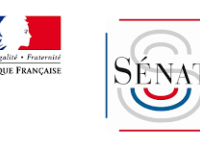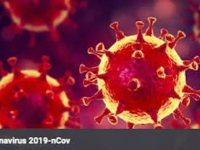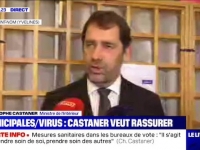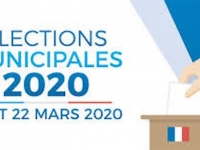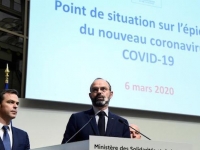Politics
THE MONITORING MISSION OF THE SENATE LAWS COMMISSION ANALYZES THE FIRST TEXTS
ABOUT COVID-19 & THE SANITARY EMERGENCY

French State of Health Emergency (Source: French Government)
USPA NEWS -
The Senate Law Commission set up a pluralist monitoring mission on March 25, 2020 to monitor the measures implemented by the Government to fight the COVID-19 epidemic. Philippe Bas (Senator, Les Républicains - Manche), chaired this mission is made up of 11 senators, representing all the political groups in the Senate, majority as opposition. This initiative is part of a coordinated approach by all the standing committees of the Senate intended to provide concrete and demanding follow-up to government action in the context of the health crisis. The work of the mission will cover all areas of the law commission. It will cover, in particular, the preservation of individual freedoms in the context of a state of health emergency, the protection of persons during confinement (domestic violence, ill-treatment of children, etc.), the possible use of personal data to combat against the epidemic ("tracking"), the continuity of essential public services, the actions implemented by local authorities and the conditions for organizing the second round of municipal elections.
The mission will be based on feedback from the field but also on the regular communication of decisions taken by the Government, the prefects and the mayors. It will also hear the ministers concerned. Ms. Nicole Belloubet, Keeper of the Seals, Minister of Justice, will be heard by videoconference on Thursday, April 9, 2020 at 4 p.m., and Mr. Christophe Castaner, Minister of the Interior, on Thursday, April 16 at 3 p.m.------------------------------------------------------------------------
According to Philippe Bas, "Parliament's control mission is all the more necessary in times of crisis, in particular to ensure the proportionality and the necessity of the measures taken within the framework of the state of health emergency. Our role is both to verify that the action of the Government fits into the legal framework assigned to it by the emergency law of March 23, 2020, but also to monitor the daily application by the public authorities of measures, certainly justified by the circumstances, but strongly derogatory from ordinary law and which limit the freedoms of each in order to protect the health of all. It is up to us to alert the Government to concrete difficulties, which require responses that are both clear and rapid. “
The monitoring mission met for the first time on April 2, 2020, by videoconference, to conduct an initial review of the measures adopted by the Government. These must respect the powers granted by Parliament and remain strictly proportionate to the objective of eradicating the Covid-19 epidemic and to the imperative of continuity of public services, particularly that of justice. The mission notes that the texts adopted by the Government generally respect the legal framework set by the emergency law of March 23, 2020. However, it notes several points of attention concerning the proportionality and the effectiveness of these measures-----------------------------------------------------------------------------------------------------------------
In general, the measures taken by ordinance can only be temporary in nature, given the multiple derogations they bring to our law. In this regard, the mission noted that several derogatory procedures could be extended up to two months after the end of the state of health emergency, which should be considered as a maximum. If the state of health emergency should continue beyond the two months authorized by the law of March 23, 2020, the Parliament, seized to authorize the extension, should then also decide, at the end of a case-by-case analysis and in light of the evolution of epidemic circumstances, if the legislative adaptations taken remain fully justified.
ON THE IMPLEMENTATION OF THE STATE OF EMERGENCY
To ensure effective control, it is important that Parliament be the recipient of all the implementing measures taken by the prefects at local level in the context of the state of health emergency, in particular when they impose more severe restrictions at the national level to the freedom to come and go from people. The mission also requests to be regularly informed of disputes opened before the administrative court over the application of measures to restrict freedoms.
The mission will pay particular attention to the carrying out of checks by the police and the application of criminal sanctions.
The functioning of the courts
The adaptations decided by the Government to ensure the continuity of the public service of justice in spite of reduced staff cannot be made to the detriment of the fundamental rights of citizens. It will be necessary to ensure that the courts give priority to referral when the complexity or gravity of a case justifies it and to be careful that lawyers are able to fully exercise the rights of defense through technical means which are only acceptable for a short time.
The monitoring mission will be vigilant about the exceptions to the rules of collegiality and the conditions under which hearings would be used by videoconference, or even by telephone, as well as the cases in which the judge will have used his power not to hold a hearing . These measures, which, as provided for by the ordinances, raise questions for some of them about the respect of the fundamental guarantees offered to the litigants, can only be envisaged in an exceptional manner in the absence of any other possibility, special attention to be brought to decisions on detention on remand.
The mission will be particularly attentive to the situation of the prisons. Certain measures decided to implement confinement, such as the suspension of visiting rooms, have led to tensions, which the prison administration has so far managed to control but which involve maintaining great vigilance. The early release of certain detainees can be a means of temporarily reducing prison overcrowding and thus limiting the spread of the virus within penal establishments. However, it must be operated with the necessary discernment and should not be used as an experiment in a new method of regulating the prison population, without direct or even indirect relation to the health crisis.
ON THE FUNCTIONING OF TERRITORIAL AUTHORITIES
The flexibility made to the quorum and voting delegation conditions in local assemblies appears excessive to the mission. They go far beyond the derogations adopted by Parliament from article 10 of the law of March 23, 2020, and are also extended to permanent committees, at the risk of degrading the democratic functioning of the bodies concerned.
More broadly, the mission will be very attentive to the impact of the measures taken on the democratic life of our communities, and will endeavor to assess their relevance in small municipalities, where access to digital technology is very often insufficient.The mission also deplores the modification of the deadlines linked to the transfer of the competence to organize mobility in the communities of municipalities, leading to a particularly constrained calendar which risks obstructing the calm acquisition of competence by the public cooperation establishment intercommunal.----------------------------------------
On the management of public officials in a context of health crisis.-----------------------------------------------------------------------
The mission notes that since the administrative competitions have been suspended since March 12, the Government plans to adapt the access routes to the public service, for example by eliminating certain written tests and by authorizing the use of videoconferencing for oral tests . It stresses that the conditions implemented must not undermine the constitutional principle of equal access to public employment for citizens, according to their ability, and without other distinction than that of their virtues and talents.
ON THE MUNICIPAL ELECTIONS
In municipalities where the municipal council was fully elected in the first round, the election of the mayor and deputies must be as quick as possible to respect the voters' vote and allow the new municipal teams to start working.
The emergency law of March 23, 2020 has already made it possible to relax the quorum rules and proxies, while empowering the Government to provide other tools by order. This problem is not addressed in the published texts, which is very regrettable in view of its importance. The Government must take urgent measures to provide for voting by ballot, by correspondence or by electronic means so that the election of new municipalities can take place without delay even in the event that the confinement should be extended. With regard to litigation in the first round of municipal elections, the adaptation of the appeal period for citizens can be explained by the difficulties in gathering documents and testimony and in consulting the signature lists, which are essential documents in the electoral disputes. However, the increase in the time taken to adjudicate administrative courts must not weaken the situation of municipal councilors elected in the first round, leaving some uncertainty over their mandate. The monitoring mission therefore requests the Government to maintain the usual time for adjudicating electoral disputes, set at three months.
ON CONSULAR ELECTIONS---------------------------------------------------------------------------------------------------------------
The timetable adopted by the Government for the organization of consular elections seems particularly constrained and risks reducing the electoral campaign to its simplest form. It also assumes that the committee of scientists will issue its report on the organization of the poll no later than May 7, 2020, which may seem premature given the evolution of the epidemic. Finally, several technical questions remain pending, such as the management of consular electoral lists and the term of office of consular advisers who would be elected next June.In addition, the mission made recommendations on more specific but also important issues:
“¢ clearer instructions must be given to law enforcement and mayors regarding containment control and sanctions for offenders, some vagueness asking to be dispelled on 5th class tickets and the exercise of powers mayor police in the fight against Covid-19;
“¢ the action of mobilized civil servants must be better recognized, for example by extending the exceptional purchasing power bonus provided for employees in the private sector;
“¢ appropriate and reactive monitoring of companies in difficulty, especially when they are in default, must be implemented by the commercial courts, whose continuity of operation during the crisis is imperative in order to save jobs.
All of these observations were presented to the Law Commission, which met by videoconference on April 2 in the afternoon, and will be transmitted to the Prime Minister.
The analysis of the monitoring mission will be available at the following address: Mr. Philippe Bas (LR, Les Républicains - Manche) is the chairman of the law commission and of the emergency law monitoring mission.
THE MONITORING MISSION IS ALSO COMPOSED OF------------------------------------------------------------------------------
M. François-Noël Buffet (LR - Rhône), M. Pierre-Yves Collombat (CRCE - Var), Mme Nathalie Delattre (RDSE - Gironde), Mme Jacqueline Eustache-Brinio (LR - Val d'Oise), Mme Françoise Gatel (Union centriste - Ille-et-Vilaine), Mr. Loïc Hervé (Union centriste - Haute-Savoie), Mr. Patrick Kanner (Socialist and Republican - North), Mr. Alain Richard (La Republique en Marche - Val d'Oise ), Mr. Jean-Pierre Sueur (Socialist and Republican - Loiret), and Mr. Dany Wattebled (The Independents - Republic and Territories - North). Source : French Senate
Covid-19 Outbreak Pm Edouard Philippe State Of Health Emergency Senate Philippe Bas Gerard Larcher Commision Of Laws France Jedi Foster Rahma Sophia Rachdi
Liability for this article lies with the author, who also holds the copyright. Editorial content from USPA may be quoted on other websites as long as the quote comprises no more than 5% of the entire text, is marked as such and the source is named (via hyperlink).

